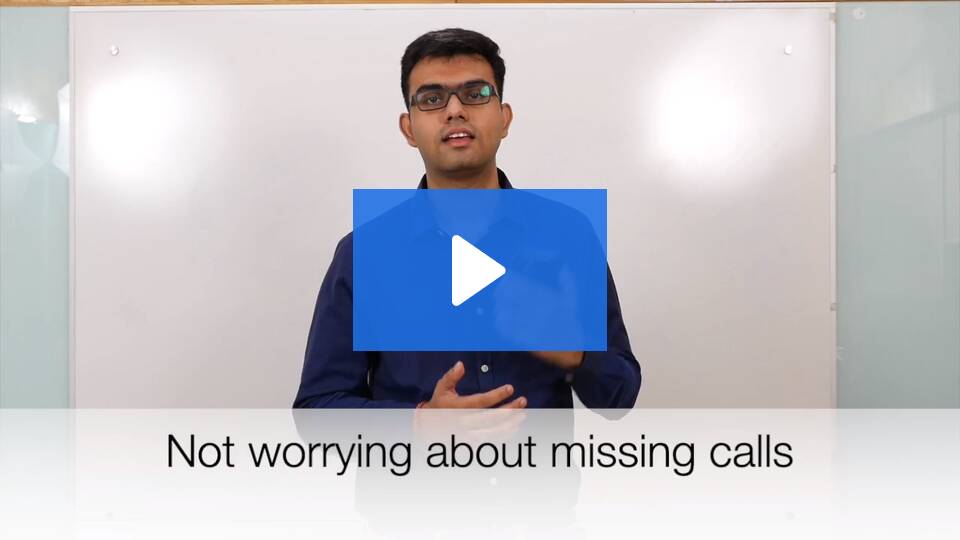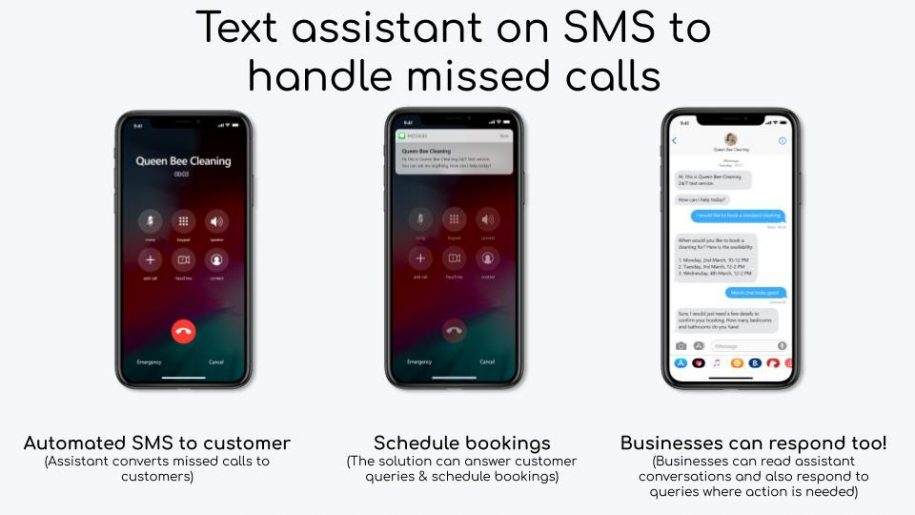What is a missed call chatbot?
The number of inbound calls you receive on your business phone number is equivalent to the number of opportunities you have to grow your business. As a small business, you want to ensure you are able to answer all customer calls (or not miss a single customer call). But we know, it’s almost impossible to be able to answer all customer calls, given the nature of small businesses. To better understand this, let’s take a step back and compare this customer behavior to the behavior on the website:
Customer A: Visits website -> Reads the message> Can’t relate > Drop off > Goes to another website that was listed on google search (in short, your competition)
Customer B: Calls your business > Call missed/number busy > Drop off > Calls another service provider that was listed on google search.
The only way to stop your customer from calling your competition when you are unavailable to answer the call is by engaging them with a text (SMS) assistant or a chatbot that works on the mobile phone. A missed call assistant or simply a missed call chatbot is a chatbot that answers all your customers’ questions in your absence and helps them book an appointment/book a service, get quotes, FAQ’s and more.
In order to measure the success of your missed call chatbot/assistant, different businesses can use different metrics. E.g. A dental practice may care about the number of new patient appointments from the call they missed, whereas a mover business may care about engaging and answer customer questions like: “Do you take bookshelves and computer desks without disassembling them?”
Why should you use a chatbot for a missed call?
Very simply put, small businesses do not have the bandwidth to answer all customer calls. Take for example a dental practice run by a single dental practitioner. He may not have the time to answer the call while in the middle of a surgery. Similarly, customers may call after work hours (post 6 PM), on weekends, or simply when you are on another call. It is not always possible to answer all calls and customers today have lesser patience to wait for a callback. They know they have options and those options are resulting in your business losing revenue. Similarly, many other small businesses like plumbing, maid services, or fitness and well spas suffer from a significant loss in revenue when they miss calls.
- Solve customer pain points
- Better engagement with existing customers
- Reduce Number of Missed Calls
- Grow your revenue
What can you do with a missed call chatbot?

Missed Call Chatbot Guide
How many calls you answer and how many you convert decides the growth rate of your business. Therefore, every information about your business that you convey to your customers should be optimized to answer customer queries. Customers don’t want to book a service without getting their basic queries answered and almost always, they need immediate assistance. Let’s take an example: If I am calling a dentist for the first time, I am calling them because of some discomfort. I don’t want to wait hours/days for the dental practice to get back to me. If one dental practice doesn’t answer my call, I will call another dental practice. It’s as simple as that. While the number of things your missed call chatbot can do could be many, we’ve taken a look at some of the most important aspect below:
- FAQ’s (Frequently asked questions): FAQs are the first thing that new visitors see on your website. They want answers to their questions before choosing to book your service with your business. Similarly, when they call you, they have questions in their mind which they need answers before they decide to book with you. E.g. A patient might want to understand what insurance you accept at your dental practice, a customer might want to know the cost of inspection for his/her plumbing needs, and so on. So ensure your chatbot that faces customers when you are not available, is ready to answer their frequently asked questions.
- Quotes: The next most obvious and important step that customers want to take either on the website or on a call is to get a sense of cost or very simply put: Quote. If you are a maid service business, customers want to understand if you charge/hour or by the size of the cleaning area or by the number of bedrooms and bathrooms. Similarly for plumbing businesses, dental practice, and all other consumer service businesses, customers first want to get a sense of pricing to ensure the service is in their budget. Ensure your assistant or missed call chatbot is equipped to answer these questions.
- Booking Appointment/Booking Service: Once a customer has got answers to their basic queries and a sense of budget, they are ready to book an appointment with your service. There is no reason why someone would go down the funnel and not book. They need the service and they will book. This is the most crucial step and hence make sure you chat bot asks relevant questions that are necessary for your business to accept a booking. E.g. a maid service company may ask the number of bedrooms and bathrooms. A dental practice may need to understand if they are an existing patient or a new patient, what’s the issue they are facing etc. While it’s not necessary that customers follow a particular pattern, it is good to be prepared and keep it conversational. Someone may directly jump to the booking, and some may first want to get their queries answered.
- Cancellation/Reschedule: We need to be cognizant of the fact that not all customers call to book/get a quote. Sometimes customers want to reschedule an existing appointment. You want to end up with a no show simply because you were unable to attend to their call. The goal of your business should be to help them reschedule and not lose the customer. This can easily be done by enabling your missed call chatbot to present the customer with some future dates for availability and that way you don’t lose the customer/revenue.
Remember, we miss calls all the time, given the service heavy nature of most small businesses. But think about what the business lost because they did not answer your call
- A Paying Customer
- A Recurring Customer
- A Referral
- A Review
- And probably even trust to ever consider coming back
4 mistakes to avoid while setting up your missed call chatbot
Mistake 1: Don’t send them to website link A lot of small businesses trigger an automatic SMS in response to a missed call, with the website form link. While this is helpful, it does not necessarily convert to revenue because customers are looking for an answer to some questions and are looking to have a conversation. Remember a chatbot can let the customers have that experience.
Mistake 2: A one way SMS/Voicemail doesn’t help Just the way an SMS with a form link is not of much help, similarly, an SMS or a voicemail is not helpful because it’s a 1-way conversation where only the customer can say something and not a two-way conversation where they get a response from the business. This is where the missed call chatbot can come in and converse with the customer just the way a human being would.
Mistake 3: Don’t make it like an IVR, make it conversational One of the most obvious mistake we have seen businesses make is: Creating an IVR like experience on the chatbot. I.e. asking customers to respond with numbers in response to their queries. Remember we are in 2020 and technology has evolved a lot. People hate IVR. They just use it because they don’t have an option. But you have an option to create a great customer experience and not a traditional IVR. An IVR will most certainly lead to conversion loss.
Mistake 4: Ensure you call back if someone has requested a callback Remember, if people request a callback, they are trusting you to call them back because they want to book a service with your business. If you don’t call them back based on their request, you are not only losing business, but also their trust. Be prepared to see a negative review on your favorite review sites if you don’t attend to your customers’ requests. In short, let people request a callback and also call them back once they have requested for it.
Missed call chatbot examples in popular industries
The problem of missed calls is not just limited to one industry. Almost any business that receives inbound calls is at the risk of missing calls and losing business. Let’s take an example for 4 different industries on how the chatbot would behave. While the goal of the missed call chatbot remains the same – Engage customers and grow revenue, the conversations can differ significantly as different industries offer different services.
- Missed Call ChatBot in the Plumbing/Dental/Spa and Salon/Maid Service Industry
All of the above industries are very unique with the customer’s needs being almost immediate. Think about customer-facing water clogging or severe tooth pain they don’t want to wait for a day to let your service get back to them. They are looking for someone who can solve their problem as soon as possible if not instantly. This is why missing a call in these industries is a big NO. Below is the set of queries service companies should be ready to engage customers on if a call is missed while they are busy handling other customers.
- Capability to understand if its a new or an existing customer
- The issue they are facing or service they are looking for
- Address where the inspection needs to happen if its an in-home service
- Quote based on the issue
- Availability of an appointment
- Payment, if possible with the capability to reimburse
- Canceling an existing appointment
- Rescheduling an existing appointment
- Insurance queries, if its a medical use case (e.g. dental)
- Request a callback
- FAQ’s
Conclusion
After reading this comprehensive piece on missed call chatbot, you should now be fully equipped to launch your own missed call chatbot. Follow each step involved diligently and be wary of all major and minor mistakes that you can commit if you do not give data the importance it deserves. Here data is nothing but what do customers call you most for. Automate repetitive tasks and stop worrying about missing calls for your small business. Missed call chatbots are invaluable when it comes to improving your business revenue over calls. A system always costs less than a human being.
If you found this guide useful, spread the word, and help fellow small businesses. If you are looking to solve the problem of missed calls, learn more about Emitrr on emitrr.com

 4.9 (400+
reviews)
4.9 (400+
reviews)
